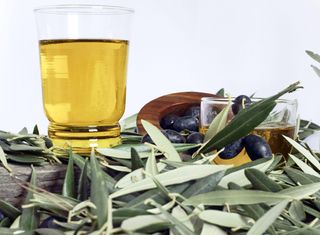Should we be avoiding this 'healthy' vegetable oil?

It's been marketed as a health food, but a new study by researchers at Philadelphia's Lewis Katz School of Medicine suggests that canola oil could promote weight gain, damage memory and learning skills and even worsen Alzheimer's symptoms.
What is canola oil?
Canola oil is a vegetable oil closely related to rapeseed oil. It comes from a plant with yellow flowers which has been specially bred to remove the elements thought to make rapeseed oil bitter and potentially toxic in large amounts. Canola oil is low in saturated fat and high in ‘heart healthy' monounsaturated fats. It also contains polyunsaturated omega-3 fatty acids, which have been linked with a host of health benefits, as well as phytosterols which may help reduce levels of bad cholesterol.
However, most canola oil is heavily processed using heat and chemicals. This can turn it rancid, destroy its beneficial omega-3s and even create harmful trans fats, according toHarvard's Dr Guy Crosby.

What does the research say?
The new study tracked two groups of rats over a year, half of whom were given 2 tbsp of canola oil a day. After 12 months, the rats in the canola group had gained more weight. Their memories and learning abilities also seemed to have worsened, making them less good at navigating mazes than the rats who'd eaten a normal diet.
The rats on the canola diet had also developed more amyloid plaques (which are thought to cause cell death and tissue loss in Alzheimer's patients) in their brains.
"Even though canola oil is a vegetable oil, we need to be careful before we say that it is healthy," said Dr Praticò, the study's lead author."Based on the evidence from this study, canola oil should not be thought of as being equivalent to oils with proven health benefits."

In a previous study, Dr Praticò and his colleagues had investigated the impact of extra virgin olive oil on Alzheimer's symptoms. They discovered that, unlike canola oil, olive oil seemed to improve memory, and even reduced the build up of amyloid plaques in the brain.
Sign up for the woman&home newsletter
Sign up to our free daily email for the latest royal and entertainment news, interesting opinion, expert advice on styling and beauty trends, and no-nonsense guides to the health and wellness questions you want answered.
Time to rethink that shopping list?
-
 Katie Holmes broke an unspoken fashion rule in tights and mules - her shoes are available for less than £100 on Amazon
Katie Holmes broke an unspoken fashion rule in tights and mules - her shoes are available for less than £100 on AmazonThe statement gold kitten heels are a surprisingly versatile spring staple
By Charlie Elizabeth Culverhouse Published
-
 The diet linked to longer and better sleep, revealed by new study
The diet linked to longer and better sleep, revealed by new studyThe study looked at data from tracking apps to see what foods were more likely to lead to better sleep
By Kat Storr Published